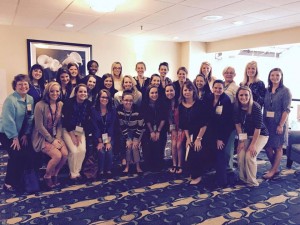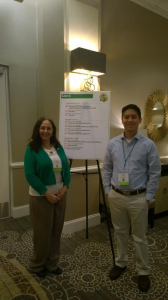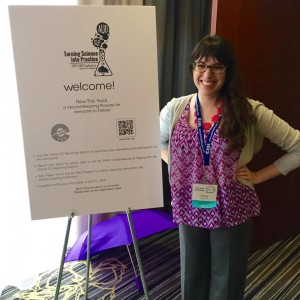2014-2015
Blue Ridge Symposium
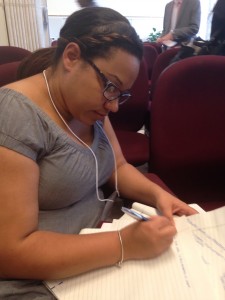 Having the opportunity to attend the Blue Ridge Symposium was really awesome. I was able to spend time with three professors in my discipline in addition to my class mate. Hearing Paul Matsuda speak enhanced the course materials related to his theoretical approach. My ability to apply the concepts from class was really improved by hearing the various speakers and having the chance to converse with colleagues.
Having the opportunity to attend the Blue Ridge Symposium was really awesome. I was able to spend time with three professors in my discipline in addition to my class mate. Hearing Paul Matsuda speak enhanced the course materials related to his theoretical approach. My ability to apply the concepts from class was really improved by hearing the various speakers and having the chance to converse with colleagues.
SHAV Conference 2015
I was afforded the opportunity to attend the Speech Hearing Association of Virginia (SHAV) 2015 conference. During this conference I was able to attend multiple sessions ranging from facilitating language with pre-school children with hearing loss, understanding common medical diagnoses and their relationship to swallowing disorders, treatment and evaluation of students with autism, and selecting an appropriate communication method for students with alternative and augmentative communication needs. At SHAV, I was also given the opportunity to interact with experienced speech-language pathologists within the area and to speak with local employers. SHAV allowed me to not only expand upon the knowledge I have gained at Longwood University, but it also allowed me to begin connecting with employers and working speech-language pathologists, which I hope will become valuable resources and connections following my graduation this coming May.
VSRA Reflection on Media Literacy
The VSRA conference supported my professional development in a way that no other professional development experience has. I was able to collaborate with people in varying aspects of our field. This allowed me to build contacts and resources that I would not have had access to otherwise. I met Professors, Researchers, Authors, Superintendents, Reading Specialist, expert teachers, and other graduate students. The experience was irreplaceable for me. I have grown professionally and academically. Presenting in class or demonstrating lessons for faculty or students is no longer a situation that makes me anxious. Experiencing presenting in this forum gave me the necessary tools to further my academic career and my professional career.
2015 Blue Ridge Symposium
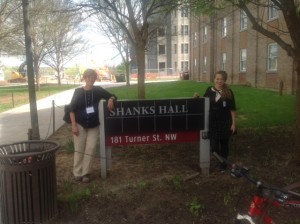 On April 18th, I had the privilege to attend the 2015 Blue Ridge Symposium at Virginia Tech. The original date in February was cancelled due to snow, but it was certainly worth the wait.
On April 18th, I had the privilege to attend the 2015 Blue Ridge Symposium at Virginia Tech. The original date in February was cancelled due to snow, but it was certainly worth the wait.
The symposium consisted of two keynote speakers, Paul Kei Matsuda and Alexis Hart, as well as a panel of graduate students attending (and teaching) at Virginia Tech. This year’s subject was diversity in the college classroom, first generation college students, and L2 learners (students whose first language is something other than English. This term is preferred to ESL generally, and I honestly agree with it because referring to a student as “ESL” prioritizes English over their first language–which shouldn’t be the case).
One of Matsuda’s major points regarded the myth of a homogenous university, and the importance of college instructors learning to accommodate the increase of L2 writers in the classroom. Also, understanding the different cultural values students will bring in and how that changes their perception. For instance, plagiarism. I have been warned about the repercussions of plagiarism throughout my education, but the ideas about intellectual integrity vary from culture to culture, thus, making it an even more complex issue to deal with in the classroom. Matsuda also suggested college instructors perhaps learn ways that they can accommodate L2 learners in their classroom, and I think he’s absolutely right in that.
Alexis Hart’s talk regarding student veterans was particularly compelling to me because I haven’t really thought about the diversity they contribute to a classroom, but thinking about it now they really do. Veteran students have very different experiences that will influence their presence in the classroom, as well as their approach to academic work. In my personal experience, friends of mine who are student veterans tend to be much more mature, however, as Hart’s talk emphasizes, it’s much more complex than that. She suggests that college instructors make sure student veterans know what resources their university has for them, both academically and emotionally. I really liked her suggestions for college instructors as far as accommodating veteran students. One that I particularly liked was to have the syllabus available before the course begins so they can know what they’re in for, particularly if the class plans to cover something triggering they can drop the class, or speak to the professor in advance.
One of my favorite suggestions for helping L2 learners’ writing process is to allow them to pre-write and draft in their first language, and then to write their final papers in English. Matsuda also suggests allowing students to use academic sources in other languages.
Many thanks to my professor, Dr. Lettner-Rust, for such a great opportunity! I certainly learned a lot about what to consider for my own future classrooms. Also, free books! Who wouldn’t love a conference with free books?
2015 Virginia Social Science Association Conference
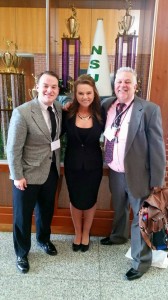 As a graduate student, the opportunity to present research and gain experience through a conference setting is vital. The benefits we gained from this experience are irreplaceable, and being granted the chance to network and discuss future research with other graduate students and professors was most helpful. As an upcoming graduate, this experience helped me to gain a better understanding of the expectations at conferences as well as gave me an advantage in my career search. All three of us in attendance from Longwood University feel as though this was a most beneficial conference to attend and see all of our hard work pay off.
As a graduate student, the opportunity to present research and gain experience through a conference setting is vital. The benefits we gained from this experience are irreplaceable, and being granted the chance to network and discuss future research with other graduate students and professors was most helpful. As an upcoming graduate, this experience helped me to gain a better understanding of the expectations at conferences as well as gave me an advantage in my career search. All three of us in attendance from Longwood University feel as though this was a most beneficial conference to attend and see all of our hard work pay off.
SHAV Convention 2015
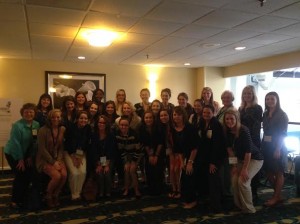 I had the privilege of attending the Speech-Language-Hearing Association of Virginia’s annual conference held in Richmond, Virginia. I attended the day-long conference on Thursday, March 26th and Friday, March 27th. This was my second year attending the conference and I hope to continue this new tradition in the years ahead. I had the opportunity to attend sessions held by a variety of experienced and educated professionals including speech-language pathologists, health care administrators, and otolaryngologists. Each session was engaging and highly educational. The sessions in which I attended were on the topics of swallowing, voice, intervention in ICU, providing services for individuals with severe disabilities, service delivery, auditory processing disorders, and autism spectrum disorder (ASD). The information that I learned from attending these sessions directly relates to the information I have learned from the graduate program at Longwood University. I will use the knowledge I learned at the SHAV 2015 Convention in my current internship and throughout my future career as a speech-language pathologist. I am thankful to have had this great opportunity.
I had the privilege of attending the Speech-Language-Hearing Association of Virginia’s annual conference held in Richmond, Virginia. I attended the day-long conference on Thursday, March 26th and Friday, March 27th. This was my second year attending the conference and I hope to continue this new tradition in the years ahead. I had the opportunity to attend sessions held by a variety of experienced and educated professionals including speech-language pathologists, health care administrators, and otolaryngologists. Each session was engaging and highly educational. The sessions in which I attended were on the topics of swallowing, voice, intervention in ICU, providing services for individuals with severe disabilities, service delivery, auditory processing disorders, and autism spectrum disorder (ASD). The information that I learned from attending these sessions directly relates to the information I have learned from the graduate program at Longwood University. I will use the knowledge I learned at the SHAV 2015 Convention in my current internship and throughout my future career as a speech-language pathologist. I am thankful to have had this great opportunity.
SHAV 2015 Conference Review
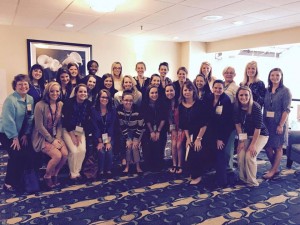 This past weekend I attended my first SHAV conference in Richmond, VA. As a first year attendee I didn’t know what to expect, and I was overwhelmed by the number of seminars available. One seminar that caught my attention was titled Using Structured ‘TEACCHing’ to Build Communication in Students with ASD. This two-hour session highlighted how the use of visual supports, such as visual schedules, can be used to increase independence and decrease behavioral issues in students diagnosed with Autism Spectrum Disorder. At the end of the session we examined several of the visual supports that presenter Diane Talarico-Cavanaugh, M.ED. has created and modified. We were then encouraged to take away a few of the printed supports to use in therapy sessions. In addition to attending the seminars, I spent time walking around the exhibit hall. I explored vendor resources that can be implemented into therapy such as articulation cards, and sampled Simplythick Instant Food Thickener for the first time. Overall, this experience was educational and fun! I enjoyed expanding my education outside of the classroom and clinic, and especially enjoyed sharing the experience with Longwood peers and faculty!
This past weekend I attended my first SHAV conference in Richmond, VA. As a first year attendee I didn’t know what to expect, and I was overwhelmed by the number of seminars available. One seminar that caught my attention was titled Using Structured ‘TEACCHing’ to Build Communication in Students with ASD. This two-hour session highlighted how the use of visual supports, such as visual schedules, can be used to increase independence and decrease behavioral issues in students diagnosed with Autism Spectrum Disorder. At the end of the session we examined several of the visual supports that presenter Diane Talarico-Cavanaugh, M.ED. has created and modified. We were then encouraged to take away a few of the printed supports to use in therapy sessions. In addition to attending the seminars, I spent time walking around the exhibit hall. I explored vendor resources that can be implemented into therapy such as articulation cards, and sampled Simplythick Instant Food Thickener for the first time. Overall, this experience was educational and fun! I enjoyed expanding my education outside of the classroom and clinic, and especially enjoyed sharing the experience with Longwood peers and faculty!
Catherine Stergar
Speech-Language-Hearing Association of Virginia Conference
 I am grateful to have recently attended the Speech-Language-Hearing Association of Virginia (SHAV) Conference this spring. I was able to attend multiple sessions, including one for infant feeding and swallowing, as well as communication and Autism. The infant feeding and swallowing session, “Feeding Therapy for Babies in the Gray,” had really piqued my interest in the world of Pediatric feeding and swallowing disorders. I learned different food consistencies for children, signs/symptoms to look for in childhood Dysphagia, as well as evidence-based treatment strategies. Furthermore, I am happy that I had the opportunity to network at the convention, and meet several recruiters and venders from various companies and organizations. I’m sure those contacts will be of great use after graduation. The SHAV convention was a wonderful opportunity to learn and network, and I’m sure that I will return next year.
I am grateful to have recently attended the Speech-Language-Hearing Association of Virginia (SHAV) Conference this spring. I was able to attend multiple sessions, including one for infant feeding and swallowing, as well as communication and Autism. The infant feeding and swallowing session, “Feeding Therapy for Babies in the Gray,” had really piqued my interest in the world of Pediatric feeding and swallowing disorders. I learned different food consistencies for children, signs/symptoms to look for in childhood Dysphagia, as well as evidence-based treatment strategies. Furthermore, I am happy that I had the opportunity to network at the convention, and meet several recruiters and venders from various companies and organizations. I’m sure those contacts will be of great use after graduation. The SHAV convention was a wonderful opportunity to learn and network, and I’m sure that I will return next year.
Aja Walker
SHAV Annual Conference 2015
While I have been to other SLP Conferences, this was my first time at the Speech-Language & Hearing Association of Virginia’s Conference. It is always great to attend these conferences and learn the most up to date information for our field. As a graduate student, meeting professionals who are working in this field is a great reminder of what we are putting in all of our hard work for. We received a wealth of information on new products in the field from vendors and were given samples (and hula hoops). The most beneficial information however came from the courses that were offered. I had the privilege of sitting in on multiple courses on swallowing, language, and social communication. The information I learned from these courses corresponded to information that we have been taught or are learning at Longwood. It was great to know that our professors are some of the leaders in this field and to hear stories from others about how all of our information will be useful once we hit “real life.” A part of the conference that was surprisingly informational was a student luncheon that many of us attended on the second day. In this luncheon we were given a wealth of information on the steps to take immediately after graduating from our masters program. This part of the day was catered specifically to graduate students and many members of the SHAV board of directors attended and were answering any and every question we may have. I am so glad that I was given the opportunity to attend this conference.
SHAV conference 2015
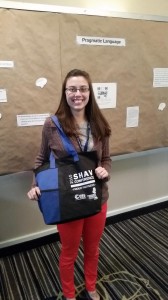 Last weekend I had the privilege to attend the Speech-Language Hearing Association of Virginia (SHAV) conference in Richmond. It was an incredible experience and I was able to be a part of it as a graduate student! I had the opportunity to hear multiple speakers talk about fascinating subjects. I heard Caley O’Connor speak about feeding therapy for babies. She explained which children should receive therapy, who should not, and who is on the border of needing therapy. I also had the opportunity to hear Robin Morlier speak about the assessment and intervention of bilingual children, focusing mainly on Spanish speaking children. Many audience members also chimed in which made the session that much more engaging. It was a wonderful and educational experience. I was happy to be able to share in the experience with my friends from my CSDS graduate program. This was my first conference and it was a great one to start off!
Last weekend I had the privilege to attend the Speech-Language Hearing Association of Virginia (SHAV) conference in Richmond. It was an incredible experience and I was able to be a part of it as a graduate student! I had the opportunity to hear multiple speakers talk about fascinating subjects. I heard Caley O’Connor speak about feeding therapy for babies. She explained which children should receive therapy, who should not, and who is on the border of needing therapy. I also had the opportunity to hear Robin Morlier speak about the assessment and intervention of bilingual children, focusing mainly on Spanish speaking children. Many audience members also chimed in which made the session that much more engaging. It was a wonderful and educational experience. I was happy to be able to share in the experience with my friends from my CSDS graduate program. This was my first conference and it was a great one to start off!
